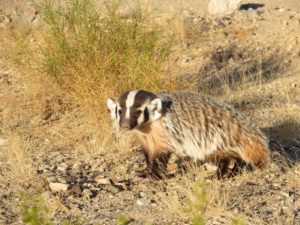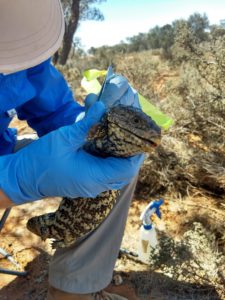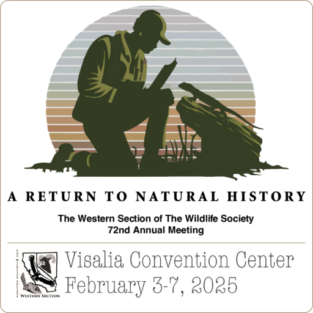Wildlife Society Certification Application Workshop/Q&A
- Tuesday, 1:00 -3:00pm
- Free, included with Annual Meeting Registration
- Led by Kelly Holland (GEI Consultants) AND Rhys Evans (Vandenberg Space Force Base) – TWS Certification Review Board
The Certification Workshop will begin with a 30-minute overview of certification, the application, and the process. Following the presentation, we will answer questions you may have about your application. Bring a draft of your application (ideally including college transcripts), or just bring questions. Ask how, why and when to apply to become an Associate or Certified Wildlife Biologist. One-on-one discussion is our intent, but that will depend upon how many people show up! This is NOT intended as a formal session, it’s casual conversation; you do not need to be present for the full hour (but it is probably going to be ‘first come, first served.)
Publishing and Peer-Reviewing Scholarly Papers: Process, Pitfalls, and Responsibilities
- Wednesday – 8:00am to 10:00am
- Free, included with Annual Meeting Registration
- Chair: R. J. Gutiérrez
- Link to Workshop Files
I developed this workshop for the 2018 annual meeting because of Western Section of TWS members had requested a such a workshop to aid graduate students and young professionals in their quest to publish scholarly papers as well as review such papers for peer-reviewed journals. Based on excellent criticism of last year’s workshop, I have revised this workshop to steam line the presentation. Although it is intended for students and young professionals, experienced researchers may glean a few tidbits about this process as well as hear about some trends I see emerging in publishing research. Therefore, the purpose of this workshop is to provide an overview of the process of publishing and reviewing papers. Researchers employ many strategies when publishing papers, so there is no magic strategy for success. In this workshop, I will simply provide my perspective on things to consider when one is trying to publish a paper including selection of journals, how to interact with editors, and respond to reviewers. These are observations synthesized from my own experiences over several decades as an author, reviewer, and editor. Therefore, I broad issues of “why publish, what to publish, when to publish, how to publish, and where to publish.”
A related activity in scientific publication is the professional responsibility to serve as a peer reviewer of scholarly papers written by others. The peer-review system exists only because of volunteer peer-reviewers, so, if you publish, you have a professional obligation to serve as a peer reviewer. Peer review is essential for maintaining the integrity of the scientific research. In addition to being a professional obligation, there are many moral and ethical responsibilities associated with peer review that I will discuss. I will also discuss such topics as the purpose of peer review, blind and double-blind review systems, the elements of a good review, how to comport yourself in developing your written review, how to detect scientifically or politically biased papers, and when you should recuse yourself from reviewing.
R. J. Gutiérrez is Professor and Gordon Gullion Chair Emeritus at the University of Minnesota, St. Paul and Senior Scientist at the University of Wisconsin, Madison. He has been involved with peer-review and scientific publishing for nearly 50 years. During that time, he has served on the editorial board for 3 international journals, as an independent editor for many compendia, and as a reviewer of more than 1,000 papers.
Yoga Stretch & Move with Kelly Holland
- Wednesday and Thursday, 7:00-8:00am
- Free, included with Annual Meeting Registration
Join us for a morning movement class to stretch our muscles and wake our bodies up! Nia blends the expressiveness of dance arts, the power of martial arts, and the wisdom of healing arts. This guided class will embody gentle and playful movements and graceful self-awareness. Classes are taken barefoot to soul-stirring music, and are adaptable to every age and fitness level. Come experience the joy of movement, and discover how Nia is expressive, healing, balancing, and powerful. Yoga mat is optional.
Kelly Fitzgerald-Holland holds a black belt in The Nia Technique, and has been teaching classes for over 18 years. She incorporates her other movement training, such as tai chi, yoga, and tribal-trance, into her classes. She creates a non-judgmental atmosphere in which to encourage, inspire, and support each individual’s pursuit of integrative body-mind-spirit awakening, healing, and empowerment.
Birds of a Feather Sessions
- Wednesday, 6-7pm
- Free, included with Annual Meeting Registration
- Apps for Biologists – Join us for an informal discussion on apps that are available for biologists, including the opportunities and constraints they offer, along with a group discussion. Hosted by Matthew Bettelheim and John McNerney.
- Consulting Fatigue – The ecological and biological consulting is an industry that is fast-pasted and highly variable. Under the right conditions, consulting can be rewarding. In other cases, consulting can be a daily grind of watching big yellow machines push dirt around; repeating worker environmental awareness trainings to under-interested attendees; and/or leaving you with the feeling that you may not be contributing the way you had hoped. Consulting fatigue is a real thing. If you are feeling it, lets get together and talk about it. You are not alone. Hosted by Jeff Alvarez.
Lunch ‘n Learn: Turning Sound into Discovery: Using Wildlife Audio Recorders as a Valuable Research Tool
- Thursday, 12:00pm to 1:30pm
- Includes Lunch – Choice of (1) Spinach Feta Chicken Wrap or (2) Vegetarian Caprese Wrap. Served with Kettle Chips, Fresh Fruit, Cookie and Assorted Sodas and Juices. Let us know if you have special dietary requirements.
- No cost, limited space – signup here
- Sponsored by Wildlife Acoustics
Sound analysis is increasingly becoming a valuable tool for biologists, environmental scientists and managers to survey and monitor wildlife populations. It is currently used to aid in resource management, habitat health assessment, regulatory compliance goals, animal behavior studies and even documenting the effects of climate change. Recording sound with a bioacoustics recorder is a reliable way to meet these project objectives. Bioacoustics is a non-invasive, cost-effective and an unbiased method for studying animal presence. Biologists all over the world have made the Song Meter platform the standard for bioacoustics recording with over 150,000 recorders deployed in 90 countries. This hands-on workshop will teach participants the features and set up of the Song Meter Family recorders to monitor for bats, birds, frogs, and other wildlife. To participate in this workshop, please sign up here to save your seat – limited to the first 40 signups.
Museum of Outdated Technology
Bring your old, outdated technology and showcase it in our exhibit hall. For fun, for nostalgia, and to build an awareness and appreciation of how far we’ve come! Anyone carry a giant Trimble GPS or a Planimeter around? How many Blackberries and Palm Pilots can we bring out of the woodwork? Paper maps? The underlying goal is to collect and recycle any items appropriately. This will be a fun walk down memory lane, and also a service to members. An e-waste recycler will be available to pick up any relics no longed needed after the meeting. Or take your relics home. Or sell your relics on eBay and donate the proceeds to the Western Section. Led by Cynthia and John Perrine.
 Photo by Mandy Culpepper, from the 2019 Annual Meeting Wildlife Slideshow
Photo by Mandy Culpepper, from the 2019 Annual Meeting Wildlife Slideshow
